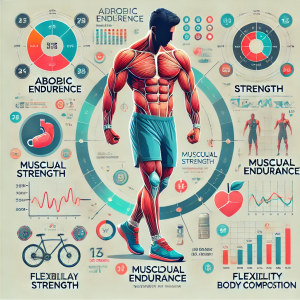Introduction
In today’s world, where diseases are on the rise, it is crucial to prioritize physical fitness. Achieving a true fitness mindset involves more than just exercise; it requires a holistic approach that includes proper nutrition, a positive mindset, and a commitment to long-term health. This guide will provide you with everything you need to know to develop an empowered fitness mindset and achieve your fitness goals.

Chapter 1: The Basics of Fitness
The journey to physical fitness begins with understanding the basics. Fitness is not just about strength or endurance; it’s about achieving a balance among various components, including aerobic endurance, muscular strength, muscular endurance, flexibility, and body composition. Each component plays a vital role in overall health and well-being.
- Aerobic Endurance: Activities like cycling, jogging, and walking increase the oxygen demand on your body, training your heart and muscles to use oxygen efficiently.
- Muscular Strength: This is the ability of your muscles to produce force, utilizing anaerobic energy for short-term bursts of power.
- Muscular Endurance: This measures how your muscles can repeatedly generate force to maintain activity, combining both anaerobic and aerobic energy.
- Flexibility: The ability to stretch muscles beyond their limits, reducing injury risk and improving performance in activities like yoga and swimming.
- Body Composition: Understanding the percentages of bone, muscle, and fat in your body helps in assessing fitness and health in relation to age and weight.

Chapter 2: The Condition of People’s Health These Days
Modern lifestyles have led to an alarming increase in health risks, affecting overall fitness. Factors such as poor nutrition, lack of physical activity, and high stress levels contribute to the decline in physical well-being. However, individuals have the power to change their fitness levels through conscious efforts and lifestyle changes.
- Influence: Your actions significantly impact your fitness. Making healthy choices and living an active lifestyle can prevent diseases and improve fitness.
- Routine Changes: Altering your workout routine keeps your body guessing and prevents adaptation, which can hinder progress.
- Nutrition: Eating healthy foods, controlling portion sizes, and maintaining a balanced diet are crucial for fitness improvement.
- Hydration: Drinking enough water is essential to avoid dehydration and maintain energy levels.
- Stress Management: High stress levels can negatively impact fitness, making stress management techniques important.

Chapter 3: What Is True Fitness
Fitness encompasses various attributes, including the ability to perform physical activities and maintain strength and energy levels. Understanding the components of fitness, such as cardio-respiratory endurance, muscular strength, muscular endurance, body composition, and flexibility, helps in assessing and improving your fitness level.
Chapter 4: What Is the Empowered Fitness Mindset
Achieving fitness goals requires the right mindset. An empowered fitness mindset involves motivation, removing fear, overcoming challenges, and staying committed to your goals. Setting realistic, attainable goals and tracking progress are essential for maintaining motivation and achieving long-term success.
Chapter 5: Traditional Fitness Ideas vs. New Age Ideas
The fitness industry has evolved with new technologies and concepts. While traditional fitness ideas focus on using available gym equipment and proper nutrition, new age ideas incorporate innovative approaches, programs, and supplements. Both have their benefits, and combining elements from both can lead to successful fitness empowerment.

Chapter 6: What Does Empowerment for Fitness Mean to You (How to Set Goals)
Setting specific, measurable, attainable, realistic, and time-bound (SMART) goals is crucial for achieving fitness success. Taking your time to define your goals, tracking progress, and ensuring that your goals are realistic and attainable will help you stay on track and motivated.
Chapter 7: Why Adopt the Empowerment Mindset for Fitness
Adopting an empowered mindset for fitness is essential for overcoming challenges and staying motivated. This mindset helps you face obstacles bravely and maintain focus on your goals, ensuring long-term success and improved health.

Chapter 8: Tips for Becoming Empowered for Fitness
Engaging in regular physical activities, maintaining a balanced diet, and incorporating exercises like aerobic workouts, strength training, and stretching into your routine are vital for empowering fitness. Consulting with fitness experts can also provide valuable insights into your overall health condition.
Chapter 9: The Good and Bad About the Empowerment Mindset for Fitness
While the empowerment mindset for fitness offers numerous benefits, such as improved health, reduced disease risk, and better sleep quality, it can also present challenges, such as maintaining motivation and avoiding quick fixes. Understanding both the positives and negatives can help you navigate your fitness journey more effectively.
Conclusion
Empowering your fitness is a lifelong journey that requires dedication, determination, and a positive mindset. By setting realistic goals, maintaining motivation, and making healthy lifestyle choices, you can achieve true fitness and enjoy a healthier, more fulfilling life. Start your journey today and discover the hidden benefits of empowered fitness.
Dr. Amanda Green is an expert in stress management and sexual health education, holding a Ph.D. in Psychology. She has dedicated her career to helping individuals manage stress to improve their overall well-being and intimate relationships. Dr. Green offers workshops and private consultations that teach mindfulness and relaxation techniques specifically designed to reduce stress and enhance sexual intimacy.


